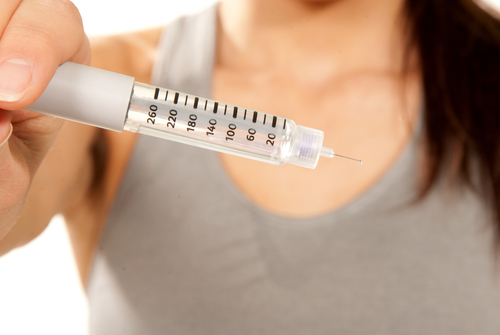
Treatments for type 1 diabetes is a lifelong, serious commitment. The overall goal is to The goal is to keep your blood sugar levels as close to normal as possible in order to proactively prevent issues (i.e., 80 and 120 mg/dL during the day and 4.4 to 6.7 mmol/L at bedtime). A combination of the following treatments is necessary:
- Prescribed insulin, in oral medication or injection form
- Regular, daily exercise to help maintain a healthy weight
- Commitment to a healthy diabetic-style diet, consisting of a balanced, nutritious meals that are low in fat, cholesterol, and simple sugars
- Daily monitoring of blood sugar
Again, with the aim to decrease blood sugar, but also to help the patient reduce weight and maintain a healthy lifestyle, common type 2 diabetes treatments include:
- A diet that adheres to the American Diabetes Association (ADA) diabetic diet, or balanced, low fat, cholesterol, and low sugar meals.
- Exercise which goes in hand with weight reduction and increases the body’s sensitivity to insulin to control blood sugar spikes.
- Oral medications to maintain healthy levels of glucose, increase the insulin release by the pancreas and liver, cellular response to insulin, and absorption of carbohydrates by the small intestine, but only when diet and exercise fail.
A gestational diabetes diagnosis can be scary for a first time mother. It’s important to seek treatment during your pregnancy via the following methods, but also to know that the majority of pregnant women with gestational diabetes deliver healthy, happy babies…
- Follow a balanced, healthy diet recommended by a registered dietitian that limits carbohydrates to control your blood sugar.
- Regular checkups with your doctor are vital for monitoring blood pressure, blood sugar levels, fetal development, as well as diet and weight.
- Monitoring blood sugar levels several times a day at home using a home blood sugar test.
- Regular exercise 30 minutes a day, 5 days a week will help control your blood sugar level. Low-impact activities like walking, Hatha yoga, and swimming are recommended.
- Insulin shots if diet and exercise alone aren’t lowering blood sugar levels. Insulin can help lower your blood sugar level without harming your unborn baby.



